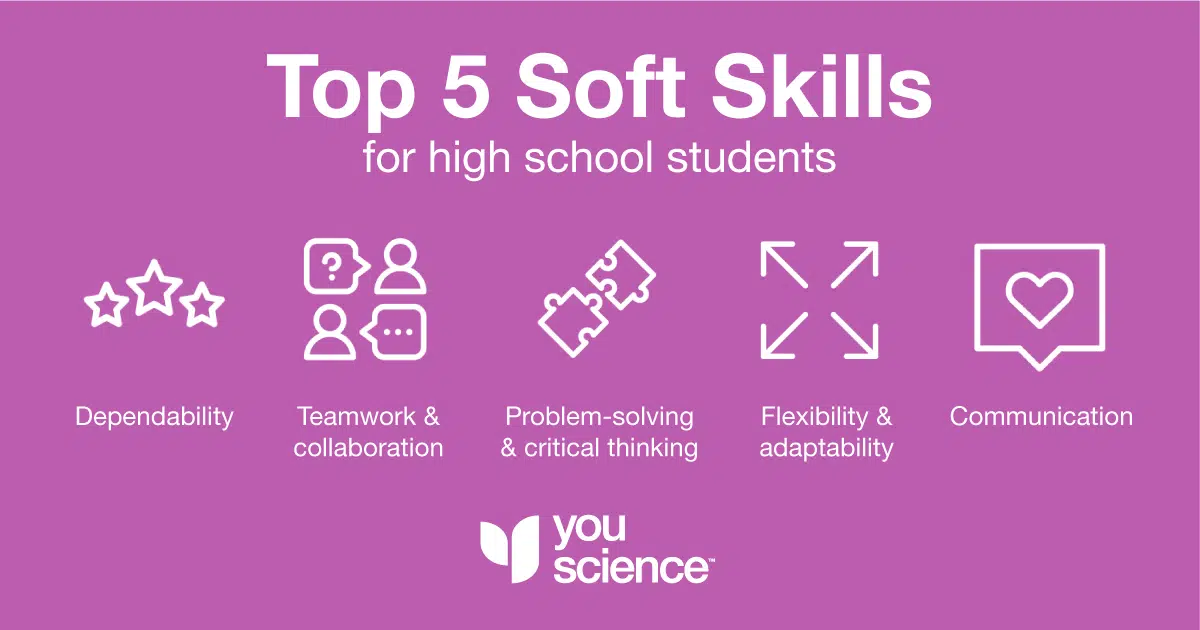Soft skills for high school students matter. Soft skills, sometimes called employability skills, 21st Century skills, professionalism skills, people skills, or interpersonal skills, relate to the non-technical aspects of a career. Think of them as character traits and work habits that aren’t necessarily written into a job description, but are skills employers find important in a successful employee.
Hard skills, or the skills necessary to accomplish a specific job, are still important to employers. However, soft skills are top of mind for employers as shown by a 2019 Global Talent Trends survey by LinkedIn that reported 92% of hiring managers value soft skills as much or more than hard skills.
Monster’s 2021 The Future of Work survey reiterated that fact by showing soft skills are among the top desired traits for candidates across industries. Developing these easily transferable soft skills in students is vital. 87% of employers reported to Monster that they were struggling to fill positions.
-
-
- Adaptability and flexibility
- Communication
- Conflict resolution
- Creativity
- Critical thinking and problem-solving
- Dependability
- Good listening
- Leadership
- Motivation
- Positivity
- Professionalism
- Responsibility
- Self-discipline
- Teamwork and collaboration
- Time management
- Willingness to learn
- Work ethic
-
The top 5 soft skills for high school students
With such a broad range of soft skills to develop, it can be hard to know where to focus.
The Perkins Collaborative Resource Network offers a framework and checklist for employability skills to provide direction to schools. It pulls soft skills into three main categories:
-
-
- Applied knowledge (AN): academic and critical-thinking skills
- Effective relationships (ER): interpersonal skills and personal qualities
- Workplace skills (WS): including resource management, communications skills and more
-
Though students have many soft skills to learn, here are five that educators can work into any curriculum and where they fall into the employability skills checklist.

Soft skill #1: Dependability (ER)
When it comes to soft skills, dependability is a powerhouse.
“Dependability” made it on Monster’s The Future of Work survey for the first time and shot to the top of the list as both the most important skill for employers and the number one skills gap.
That’s because employers want to hire someone they can trust to get the job done well and on time, so managers can focus on high-level priorities instead of micro-managing hires. When a workplace is filled with dependable employees, the whole organization thrives.
From setting attendance expectations to ensuring follow-through on commitments, the classroom is a perfect environment to build and reinforce dependability skills.
Soft skill #2: Teamwork and collaboration (ER)
The secret ingredient to any good employee is the ability to collaborate and work with a team.
Believe it or not, there are only so many projects a person can handle at once. Meaning, understanding how to work with others is a critical soft skill for avoiding mistakes and burnout in any industry.
Teamwork provides opportunities for brainstorming and problem-solving. It builds morale and creates a support system for employees. But developing this soft skill in the classroom isn’t as simple as having students work in groups.
Educators can use an intentional structure to help students practice managing team dynamics, building consensus and making decisions. Students can be empowered to prevent and manage unproductive conflict.
With this soft skill under their belts, students can feel better prepared to work effectively and efficiently with others.
Soft skill #3: Problem-solving and critical thinking (AN)
Problem-solving and critical thinking skills are some of the most in-demand skills in any workplace.
According to LinkedIn’s Global Talent Trends, 67% of hiring managers want critical thinkers on their teams. Managers want to hire someone they can rely on to handle unexpected challenges, think of new ideas or better ways of doing tasks, and generate and execute effective solutions.
Like with dependability, problem-solving as a soft skill lets a manager step out of the role of micromanager. It signals to employers that an individual has other competencies, like logic, creativity and determination, too. Because problem-solving isn’t just about finding a solution – it’s about the process.
Developing and reinforcing problem-solving at a young age positions students for success as they face increasingly complex work and interpersonal situations throughout their educational and professional careers.
Soft skill #4: Flexibility and adaptability (ER)
Flexibility is more than just a physical practice improved by doing yoga — it’s a vital soft skill in any work environment!
Change is inevitable, but it can’t always be predicted.
Therefore, employers value employees who can adapt and respond quickly, calmly and positively to changes, even if it means stepping outside of their job description. Having a flexible mindset helps reduce stress and results in a better work-life balance.
It’s important to help students build resiliency. Students can benefit from activities that help develop positive thinking habits, strategies for processing the impacts of change and an awareness of rigid thinking.
Soft skill #5: Communication (WS)
This list wouldn’t be complete without one of the core soft skills necessary to succeed in literally any working environment: communication.
Effective communication matters to employers. Three of the five top in-demand skills in LinkedIn’s Global Talent Trends relate to communication — listening (74%), effective communication (69%) and interpersonal skills (65%).
Whether verbal, written, nonverbal or visual, good communication skills create an environment where employees understand information more quickly and accurately, which results in more efficient teams. Good communicators can articulate their own ideas well while listening to others with empathy and an open mind.
A work environment with poor communication, on the other hand, results in unnecessary stress, frustration, misunderstandings and conflict. Even lost productivity and ultimately revenue.
Incorporating activities into a curriculum that boost communication skills can be as simple as providing opportunities for students to present to the class, separate into groups to roleplay scenarios or even play a round of Pictionary.
Why soft skills matter
The initial results of a working study of more than 150,000 students in Chicago’s public high schools show that schools that help youth develop soft skills produce students with higher grades, fewer absences, and fewer disciplinary problems and arrests in high school. Students who attended these schools graduated and went to college at higher rates too.
Combine these positive findings with employers’ increasing focus on these skills, and the picture becomes clear: soft skills for high school students matter.
However, teaching soft skills is no easy feat. There’s no clear measure of the mastery of soft skills. Nor is there a clear, consistent way to attribute soft skill development to classroom learning.
But that doesn’t mean there’s no hope for schools that want to nurture soft skills. In fact, Career and Technical Education (CTE) programs in schools provide a perfect environment to build 21st Century Skills for college and career readiness.
How CTE programs teach soft skills
In a CTE program, through hands-on learning, students build their soft skills alongside the hard skills needed for their CTE pathways. Students may even have opportunities to develop professional networks through their school’s industry partnerships or earn an industry-recognized certification to showcase their knowledge to prospective employers.
When students understand how their classroom learning connects to a career, they become more engaged and willing to develop the soft skills that will benefit them for the rest of their lives.
Validate soft skills with certification exams
It’s easy for a person to claim they have soft skills on a resume. In fact, Monster’s The Future of Work revealed that 66% of employers believe candidates exaggerate their skill levels on resumes. But how can a student prove they have soft skills?
That’s where industry-recognized certifications come in. YouScience® Industry Certifications offers a library of more than 200 certification exams that span all National Career Clusters and 21st Century Success Skills.
By earning a certification, students are empowered to articulately describe the skills they’ve obtained in school. Educators and employers can use the knowledge standards to validate and better understand the skills a candidate brings to the table.

